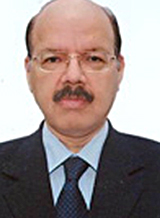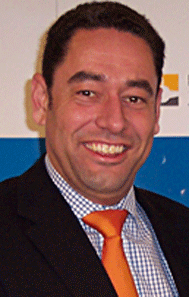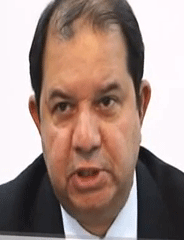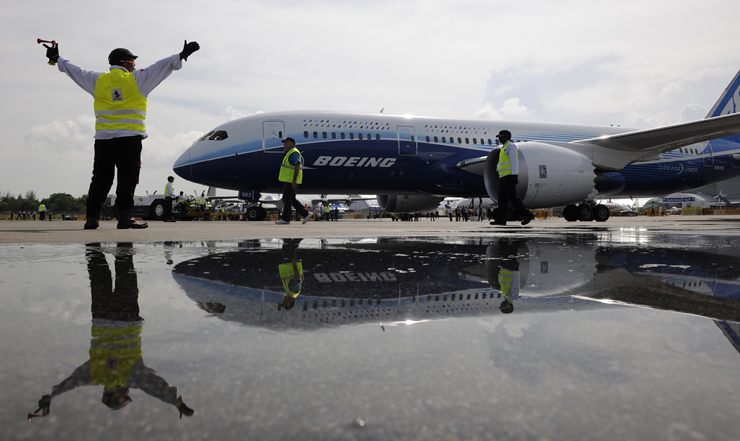  If
the presence of big names in the air cargo industry were any criteria
to judge the success of a trade show like the three-day February Air
Cargo India (ACI) in Mumbai, it surpassed all expectations. This should
be considered no small feat, considering the city’s traffic “reputation”
and the difficulty inherent in reaching the Bombay Exhibition Center.
Even so, while most air cargo stakeholders who visited the show were
generally pleased with what they got, there were a number of others
who felt that the discussions could have been juggled around a fair
bit. If
the presence of big names in the air cargo industry were any criteria
to judge the success of a trade show like the three-day February Air
Cargo India (ACI) in Mumbai, it surpassed all expectations. This should
be considered no small feat, considering the city’s traffic “reputation”
and the difficulty inherent in reaching the Bombay Exhibition Center.
Even so, while most air cargo stakeholders who visited the show were
generally pleased with what they got, there were a number of others
who felt that the discussions could have been juggled around a fair
bit.
Now in its fourth edition, the event came at
a crucial juncture: almost all the domestic carriers are in a financial
mess, with the country’s national airline, Air India, leading
the list; not one domestic freight carrier—Captain G. R. Gopinath’s
Deccan 360 and Captain Mukut Pathak’s ACE—exists today,
among other things.
These conditions notwithstanding, ACI was supposed
to emphasize India as the land of opportunities for the air cargo industry;
hence the theme “Air Cargo in India – Building sustainability
and prosperity,” and it served its purpose adequately. Said Dr,
Naseem Zaidi, Secretary, Civil Aviation, “If growth potential
of the air cargo segment is appropriately harnessed, Indian airports
could become cargo hubs in the region.” He was referring to the
new national air cargo policy that is looking at the projected air cargo
growth in the next 20 years, which stands at five times the present
rate. At the conference Dr. Zaidi announced to the world that while
a roadmap was being chalked out keeping in mind the future, the working
group on air cargo that had been set up by the Civil Aviation Economic
Advisory Council was in the process of finalizing its report and a framework
to tackle air cargo issues. “That,” said Dr Zaidi, “will
form the basis of the national air cargo policy.”
 Indeed
one of the speakers, M. Kannan, Economic Advisor to the Ministry of
Civil Aviation, enunciated the government initiatives undertaken for
the civil aviation industry in the immediate future that will have a
beneficial effect on both the air cargo industry as well as its sustained
economy. He also explained the changes that have been taking place in
the Indian air cargo industry—the country is now the ninth largest
aviation market in the world—and the main challenges to the air
cargo industry’s growth: inadequate infrastructure, slow adoption
of technology, and unskilled manpower. The country needs to match its
supply chain efficiency with global air cargo supply chains to bring
in profitability and stimulate growth. Indeed
one of the speakers, M. Kannan, Economic Advisor to the Ministry of
Civil Aviation, enunciated the government initiatives undertaken for
the civil aviation industry in the immediate future that will have a
beneficial effect on both the air cargo industry as well as its sustained
economy. He also explained the changes that have been taking place in
the Indian air cargo industry—the country is now the ninth largest
aviation market in the world—and the main challenges to the air
cargo industry’s growth: inadequate infrastructure, slow adoption
of technology, and unskilled manpower. The country needs to match its
supply chain efficiency with global air cargo supply chains to bring
in profitability and stimulate growth.
 It
must be mentioned that India has aroused the interest of airports around
the world. According to D. P. Hemanth, (right) Chief Operations Officer
(COO) for Hub Development at GMR Airports, the presence of a number
of airports at ACI was proof enough that the country’s air cargo
infrastructure was being noticed. He put it simply: “Airport infrastructure
is as critical to the supply chain as it is to the airlines and freight
forwarders and we (from the GMR Airports) were able to showcase our
Pharma Zone facilities, which Lufthansa has certified as ‘world-class’
anywhere outside Germany.” It
must be mentioned that India has aroused the interest of airports around
the world. According to D. P. Hemanth, (right) Chief Operations Officer
(COO) for Hub Development at GMR Airports, the presence of a number
of airports at ACI was proof enough that the country’s air cargo
infrastructure was being noticed. He put it simply: “Airport infrastructure
is as critical to the supply chain as it is to the airlines and freight
forwarders and we (from the GMR Airports) were able to showcase our
Pharma Zone facilities, which Lufthansa has certified as ‘world-class’
anywhere outside Germany.”
 Among
the airports that attended was Leipzig/Halle Airport, which was in Mumbai
to showcase its capabilities as a distribution center for exports from
India. According to Markus Kopp, (left) CEO, Mitteldeutsche Flughafen
AG, the aim was to expand Leipzig/Halle Airport—Germany’s
second-largest freight hub—and turn it into a gateway for Indian
manufacturers. In fact, the airport wanted to build on the cargo flights
that operate from Delhi and Bengaluru to Leipzig/Halle. The airport’s
stand at Air Cargo India not only underlined the benefits of the airport
but also included Leipzig/Halle’s partner airport, Dresden International. Among
the airports that attended was Leipzig/Halle Airport, which was in Mumbai
to showcase its capabilities as a distribution center for exports from
India. According to Markus Kopp, (left) CEO, Mitteldeutsche Flughafen
AG, the aim was to expand Leipzig/Halle Airport—Germany’s
second-largest freight hub—and turn it into a gateway for Indian
manufacturers. In fact, the airport wanted to build on the cargo flights
that operate from Delhi and Bengaluru to Leipzig/Halle. The airport’s
stand at Air Cargo India not only underlined the benefits of the airport
but also included Leipzig/Halle’s partner airport, Dresden International.
“The attractiveness of our airports for
Indian partners lies in the quality and speed of our handling operations
and the value added services that we can provide – for example,
picking goods. The whole package is rounded off by trucking services,
which now cover every part of Europe,” said Kopp.
 Others,
like Mohamed Parkar, (right) Vice President Commercial and acting Chief
Operating Officer, Maximus Air, echoed Kopp. Banking on Indians, the
largest group of investors in the UAE, Maximus displayed its international
ambitions at ACI—this was its first ever appearance at a major
show under its new avatar as Maximus Air—focusing on the Indian
sub-continent as one of the key regions for the growth of its business
outside the Gulf. The show, according to Parkar, presented an opportunity
to showcase how the carrier had grown to become a key player providing
end-to-end solutions. He also made it clear that Maximus’ presence
along with other carriers from the Gulf attested the “strong position
of the UAE and its role as an important hub for servicing the neighboring
economies. “Our expanding operations out of the UAE capital of
Abu Dhabi mean we are well placed to service the needs of those businesses
into the wider Arab world countries,” he said. Others,
like Mohamed Parkar, (right) Vice President Commercial and acting Chief
Operating Officer, Maximus Air, echoed Kopp. Banking on Indians, the
largest group of investors in the UAE, Maximus displayed its international
ambitions at ACI—this was its first ever appearance at a major
show under its new avatar as Maximus Air—focusing on the Indian
sub-continent as one of the key regions for the growth of its business
outside the Gulf. The show, according to Parkar, presented an opportunity
to showcase how the carrier had grown to become a key player providing
end-to-end solutions. He also made it clear that Maximus’ presence
along with other carriers from the Gulf attested the “strong position
of the UAE and its role as an important hub for servicing the neighboring
economies. “Our expanding operations out of the UAE capital of
Abu Dhabi mean we are well placed to service the needs of those businesses
into the wider Arab world countries,” he said.
Tirthankar Ghosh
|




